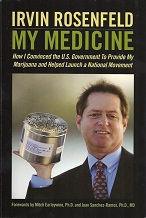While we at medicalmarijuana.com.au believe the latest changes in the Australian legislation are positive in some ways, more amendments to legislation are needed.
There is no need to tightly control medicinal cannabis as it's a safe, non-toxic herb and contrary to the propoganda, does not cause mental health issues.
The new legislation is all about big pharma and taxing those who are sick, whilst retaining the war on cannabis to hinder recreational use.
As recently stated in the senate by Senator David Leyonhjelm;
"Legalising recreational cannabis use would deprive organised crime, whether Middle Eastern crime gangs, Asian triads, bikie gangs or relatives of Darth Vader, of a major source of income, and relieve police of the cost of finding and destroying illicit crops. Of the $1.5 billion spent annually on drug law enforcement, 70% is attributable to cannabis. That’s an expense we do not need."
As long as money is involved, corruption and the black market follow.
This is something that sick people don't need to be involved with.
Now I understand that a certain amount of control is needed to make sure the sick are being cared for appropriately.
What's needed;
1) Free range style research and clinical trials.
2) Education based on science, not lies.
3) Allowing the sick, and if need be their carers, to grow their own medicine.
4) Making cannabis affordable for the sick and not allowing big pharma to monopolise the market, there's room for everyone, but we don't need an oligopoly between the large pharmaceutical companies.
Dont prey on the sick and helpless!
For an MS sufferer to afford Sativex, made by GW Pharma:
Results: In the base case, Sativex® plus oral anti-spasticity medicines resulted in incremental costs of £7600 and a QALY gain of 0.15 per person over 5 years (ICER = £49 300 per QALY) [year 2009 data for costs]. Findings were sensitive to the costs of Sativex® (price and dose) and differences in utilities between responders and non-responders.
Conclusions: Using a willingness-to-pay threshold of £30 000 per QALY, Sativex® appears unlikely to be considered cost effective by UK funders of healthcare for spasticity in MS. This is unfortunate, since it appears that Sativex® use is likely to benefit some patients in the management of this common consequence of MS.
reference:
http://multiple-sclerosis-research.blogspot.com/2012/10/research-sativex-costs-too-much.html
Cannabis is not a drug:
I reiterate, it's non-toxic as researched by Professor David Nutt
It's classified as a herb, some strains of cannabis do having psychoactive properties, giving a euphoric feeling of well being or if abused (as with consuming edibles) a not so euphoric feeling and possible feelings of paranoia.
This is where the education needs to be set in place, not the propaganda we've listened to for the past 50 years.
Remember, too much alcohol will kill you, this is a toxic substance.
Joe Rogan; world famous pod caster made the joke saying;
"The only way cannabis can kill you, is if the CIA is flying overhead and they drop 25kg out of the plane and it lands on you."
This is the scientific truth!
Ban on medical marijuana patients growing own pot struck down by Federal Court
4 B.C. residents challenged legislation introduced by the previous Conservative government
A Federal Court judge has struck down federal regulations restricting the rights of medical marijuana patients to grow their own cannabis and given the Liberal government six months to come up with new rules.
Judge Michael Phelan ruled Wednesday in Vancouver that the Marijuana for Medical Purposes Regulations were an infringement on charter rights and declared they have no force and effect.
But the judge also suspended his declaration for six months to give the federal government time to come up with new rules.
The judge was careful to point out that the ruling does not change other laws that make it illegal for Canadians to use marijuana recreationally.
The judge also ordered that an earlier injunction remains in effect, allowing thousands of Canadians with prior authorization to use medical marijuana to continue to grow it at home.
'Some fell through the cracks'
Lawyer John Conroy, who co-represented the plaintiffs in the case, noted the ruling did not automatically include all medical marijuana users.
He said the ruling applied only to about 28,000 Canadians who had the proper licences in place at the time of the injunction.
And he noted there remain thousands of other medical users not covered by the original injunction, who will still have to wait six months to legally grow their own medical marijuana themselves.
"We will be heading back to court to fine-tune that injunction," said Conroy on Wednesday afternoon in Vancouver.
In addition, many people who had to change the address of their production site no longer have valid licences registered with Health Canada, and that issue needs to be addressed, he said.
He also cautioned users who have possession licences to make sure they are updated.
"Hopefully within six months we'll have a reasonably regulated system in place that solves the problems for everyone," he said.
Conroy noted that if Prime Minister Justin Trudeau wanted to move quickly on the issue, cabinet could simply issue an order-in-council that would remove marijuana from Schedule 2 of the Controlled Drugs and Substances Act.
"The next fight is making sure the dispensaries are legal," he said.
'It was a complete victory'
Lawyer Kirk Tousaw, the co-counsel for Neil Allard, who launched the court challenge, was clearly pleased with the decision.
"Basically we won, and it was a complete victory," said Tousaw, shortly after reading the decision. "[The Marijuana for Medical Purposes Regulations] were declared to be unconstitutional and violate the charter rights of medical cannabis patients."
Tousaw said it will now be up to the Liberal government to come up with new rules.
"The ball is in the federal government's court. Mr. Trudeau and the justice minister have six months to respond to the court's ruling and come up with a system of medical cannabis regulation in this country that doesn't impact and negatively take away the charter rights of medical cannabis patients and their providers."
He believes the ruling will have implications for those who wish to grow their own pot for recreational use.
"We proved that growing medical cannabis can be perfectly safe, and can be done completely in compliance with the law and people ought to have a right to do that without fear of being arrested and locked in cages for that activity."
"The lessons I think are pretty obvious. If you can grow cannabis for yourself for medical purposes safely and with no risk for the public, surely, you can grow cannabis for yourself for non-medical purposes safely and with no risk to the public," Tousaw said.
The federal Liberal government has committed to regulating and legalizing recreational marijuana but has yet to introduce any legislation.
'Most egregious example'
In his decision, the judge noted that "many 'expert' witnesses were so imbued with a belief for or against marijuana — almost a religious fervour — that the court had to approach such evidence with a significant degree of caution and skepticism."
In particular, he called one RCMP witness for the Crown, Cpl. Shane Homequist, "the most egregious example of the so-called expert.
"He possessed none of the qualifications of usual expert witnesses. His assumptions and analysis were shown to be flawed. His methodologies were not shown to be accepted by those working in his field. The factual basis of his various options was uncovered as inaccurate," he wrote.
"I can give this evidence little or no weight," the judge concluded.
Phelan also dismissed many of the federal government's arguments concerning the risks home grow-ops could pose to homes, noting mould, fire, break-ins and insurance concerns can be addressed within existing laws and regulations.
He found the rules which "limited a patient to a single government-approved contractor and eliminated the ability to grow one's own marijuana or choose one's own supplier" were an untenable restriction on the plaintiffs' liberties.
Homegrown supply banned in 2013
The Marijuana for Medical Purposes Regulations were introduced by the Conservative government in 2013 and required patients to buy cannabis from licensed producers instead of growing their own.
The constitutional challenge was launched by Nanaimo, B.C., resident Neil Allard and three other British Columbia residents who argued that legislation introduced by the previous Conservative government violated their charter rights.
Judge Phelan heard the case between February and May 2015 in Vancouver. During the hearings, federal government lawyers argued that the regulations ensured patients have a supply of safe medical marijuana while protecting the public from the potential ills of grow-operations in patients' homes.
The lead counsel for the plaintiffs, John Conroy, told court that the legislation has robbed patients of affordable access to medicine. Some people were left with no choice but to break the law, he argued, either by continuing to grow their own or by purchasing on the black market.
references:http://www.cbc.ca/news/canada/british-columbia/medical-marijuana-federal-court-ruling-1.3461694
Latest
Coronavirus Strikes Massachusetts Cannabis Company Employees
Reassessing the Essential: Cannabis in the Time of a Pandemic
5 Reasons To Try Aspen Valley CBG Flower (30% Off)
High Times Cannabis Cups Go Virtual In Wake Of Coronavirus Pandemic
Drug Enforcement Administration Proposes Plan To Expand Cannabis Research
Ghana Legalizes Cannabis For Medicinal And Industrial Uses
The cheapest legal weed in Canada: Discover these cannabis ‘value brands’
Cannabis and coronavirus: Here’s what you need to know
cannabis designs
The Best Of
WHO Rules CBD Should Not Be a Scheduled Drug

Dr Cristina Sanchez PhD video interview on medical marijuana and cancer

Biochemist Dennis Hill interview; Cannabis oil as a cure for cancer.

The unofficial World Record holder for cannabis smoking part 1




